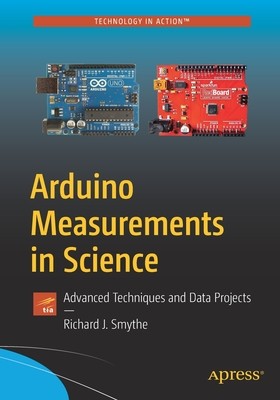
- We will send in 10–14 business days.
- Author: Richard J Smythe
- Publisher: Apress
- ISBN-10: 148426780X
- ISBN-13: 9781484267806
- Format: 17.8 x 25.4 x 3.8 cm, softcover
- Language: English
- SAVE -10% with code: EXTRA
Reviews
Description
Explore the full capabilities of your Arduino. Whether you need to measure light, heat, mass, force, or conductivity, this book can be used as a complete reference guide for making virtually any scientific measurement with your PC or Linux based system and the Arduino microcontroller.
You'll apply the Arduino and sensors to take measurements at the macro-, milli-, micro-, nano- and pico-sensitivity ranges. By working through the projects in this book, you'll learn how to apply these techniques in the lab or field in areas such as weighing samples at the gram or milligram levels, measuring water temperature to a tenth of a degree, or its conductivity in milli or micro Siemens. With these projects, you can reliably measure, store, and experiment with a wide range of scientific data.
Arduino Measurements in Science features a novel approach and several little known techniques to measure data that requires only basic and accessible hardware - perfect for the home or school workshop!
- Make basic scientific measurements with PCs, and Linux based computing systems
- Review techniques for weighing measurements down into the double and even single digit milligram
- Use inexpensive sensors and displays to quantify and validate sensor data
- Incorporate weighing scales, electrometers, magnetic and static field detectors, motion and vibration detectors, and more
- Understand the possible noise and accuracy problems that can occur and best practices to refine your projects
- See the benefits of data validation for graphical data display
EXTRA 10 % discount with code: EXTRA
The promotion ends in 17d.14:04:11
The discount code is valid when purchasing from 10 €. Discounts do not stack.
- Author: Richard J Smythe
- Publisher: Apress
- ISBN-10: 148426780X
- ISBN-13: 9781484267806
- Format: 17.8 x 25.4 x 3.8 cm, softcover
- Language: English English
Explore the full capabilities of your Arduino. Whether you need to measure light, heat, mass, force, or conductivity, this book can be used as a complete reference guide for making virtually any scientific measurement with your PC or Linux based system and the Arduino microcontroller.
You'll apply the Arduino and sensors to take measurements at the macro-, milli-, micro-, nano- and pico-sensitivity ranges. By working through the projects in this book, you'll learn how to apply these techniques in the lab or field in areas such as weighing samples at the gram or milligram levels, measuring water temperature to a tenth of a degree, or its conductivity in milli or micro Siemens. With these projects, you can reliably measure, store, and experiment with a wide range of scientific data.
Arduino Measurements in Science features a novel approach and several little known techniques to measure data that requires only basic and accessible hardware - perfect for the home or school workshop!
- Make basic scientific measurements with PCs, and Linux based computing systems
- Review techniques for weighing measurements down into the double and even single digit milligram
- Use inexpensive sensors and displays to quantify and validate sensor data
- Incorporate weighing scales, electrometers, magnetic and static field detectors, motion and vibration detectors, and more
- Understand the possible noise and accuracy problems that can occur and best practices to refine your projects
- See the benefits of data validation for graphical data display


Reviews